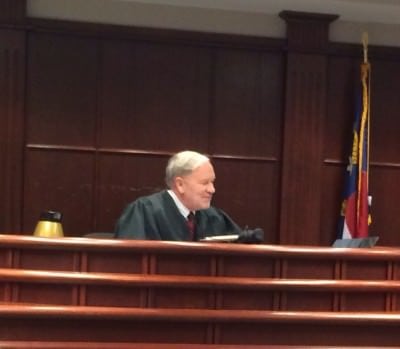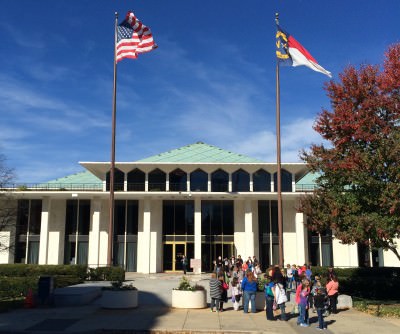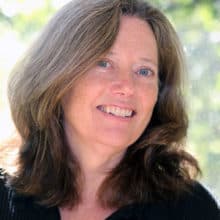Wednesday, January 15, 1868
Commons Hall (House Chambers) of the State Capitol
The delegates moved swiftly to the election of officers. Mr. Abraham Galloway moved to nominate Calvin J. Cowles of Wilkes for President. After a debate on the voting procedures, the selection of officers was resumed and Mr. Harris of Wake nominated Mr. Cowles. Mr. Hodnett of Caswell nominated Mr.Plato Durham of Cleveland. Mr. Cowles received the overwhelming majority of votes cast – 100 of 109 votes cast.
Mr. Heaton and Mr. Abbot were appointed as a committee to conduct Mr. Cowles to his seat.
This gives all appearances of a well-choreographed event. Delegates Galloway and Harris were two of the black delegates who were well known prior to the convention. Delegates Abbott and Heaton had both served in Congress and were viable candidates for the position. Mr. Cowles, in contrast, had no political experience. With the solid support of the delegates, President Cowles stood and address the convention:
GENTLEMEN OF THE CONVENTION:—I see that it is unnecessary to call this Convention to order, for the greatest quiet and decorum pervades the Hall. But, gentlemen, you have seen fit to confer this high honor upon me—clothed me with extensive powers and devolved no light burdens upon my shoulders. Did I not feel a degree of trepidation in assuming the functions of this high position, it would be indeed unusual and unnatural. I trust that I will merit your confidence, and that the duties of this office will be impartially performed. I return you my sincere thanks for the honor conferred.
I shall exert myself in every way to press forward the work before the Convention. I shall know no party here, nor race, nor color, nor origin of men, but shall regard every delegate as a freeman, representing an enlightened constituency. My feet are in a new path. I am walking in a way unfamiliar. Therefore, the short-comings which may occur in the exercise of my duties will appeal for your sympathy with mute eloquence. This Convention of the people, devoid of politicians to an unusual extent, I am pleased to believe, will indulge and assist me in the discharge of the onerous task which it has imposed.
Time is precious. We must labor faithfully and assiduously. Our work done at an early day, let us adjourn and go home to our constituents, bearing a free constitution in our hands. It is true that money is scarce, and while it would be unwise to protract this session, it would be equally unwise to hurry over the most important work ever placed into the hands of free men. Were all the gold in the hills of Carolina piled up, rather let that be swept away, than defer the return of our State to the Union. That cause is worthy of the life of every delegate here present. It were better for us to perish than for our people to fall back into a chaos of anarchy or slavery.
Let us go forward, then, and frame a Constitution adapted to the advanced ideas of the age. Beware of extraneous matters. Let us first accomplish the grand work of restoration, so far as it is in our power. Let the fundamental laws here adopted protect all men equally for all time, for that is the great requirement of the hour. The Convention will proceed to business.
After electing other officers, the delegates considered a resolution offered by Mr. Pool of Pasquotank that provided that no purely legislative propositions be entertained until after the Constitution is adopted. This sparked debate with Mr. Jones of Washington commenting that delegates “would sit here with their fingers in their mouths, doing nothing” while waiting for the adoption of the constitution. The matter was not resolved before they adjourned until 10 o’clock tomorrow.
Recommended reading



